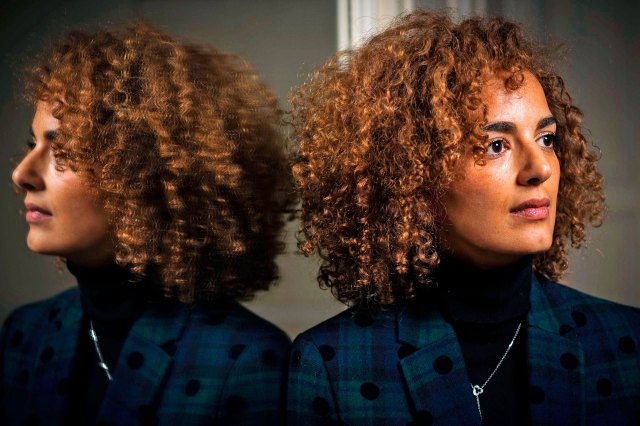“When I write, I’m no longer a polite little girl” (LIONEL BONAVENTURE/AFP via Getty Images)

Ever since my childhood, I’ve been afraid of them. I was five years old and they had the face of Iranian ayatollahs. I was 15 and they raged through neighbouring Algeria. I remember, on television, their faces eaten up by bushy beards, their cheeks hollowed out by the exhaustion of guerrilla life, their crazed looks. At the time of the Algerian Civil War, some of my family took refuge in Morocco, where I lived. They fled, leaving everything behind: their work, their friends, their dreams. They told us about fake roadblocks, throat-cutting, intimidation. I was 15, and I shook with fright.
These fanatics were the night-time ogres of my childhood, the threat that never stopped growing, one that came closer and closer, became more and more visible. During the Nineties, on Moroccan campuses, the Islamists took power. The battle of ideas was being lost. On the news, we got used to that now-familiar word: “attack”. In Paris, Luxor, Algiers. In my family, we didn’t underestimate them. We knew that the more educated among them were ready to do anything to defend their vision of the world. My parents implored me to be prudent — me, who didn’t know how to shut my mouth and who played at being the rebel adolescent. No one asked me to stand my ground, to defy them. On the contrary: I was told that you had to fear them — bend the knee, keep a low profile, shut up. How do you answer parents who love you and warn you: “Don’t take risks, don’t provoke them, stay safe from their violence”?
I was 15, I was living in Rabat, and I learned to keep quiet and accept. You accepted that you had to hide when eating during Ramadan, to be afraid that somebody might smell food on you. You accepted that you had to roll up empty wine bottles in opaque bags and drive a few miles to throw them in the dustbin. You accepted that you had to listen in silence to the furious speech of a professor of religion who claimed that Jews and Christians could never go to Paradise, and you wept inside for all those you loved who weren’t Muslims, and so were exiled from Paradise. You accepted being insulted by a customs officer in Casablanca because in your suitcase, in the middle of the New Year holidays, there were things he’d identified as Christmas presents. You accepted being treated as a slut and a sinner on the beach where you’d played as a child, because now your body was an offence to God.
You accepted, and you lived both in fear and in shame. The shame of our cowardice, of the denials that fed and grew on it. The shame of not being able better to defend the Islam of my grandfather, who is in Paradise with his Christian wife. “A thousand little stings of self-reproach that add up not to remorse but to a vague unease.”* That’s what you felt. You felt ugly and small. For reassurance, you said to yourself that it’s we who have right on our side, that we know the frontiers of Good and Evil, of reason and barbarism, and it doesn’t really matter if you don’t dare defend them at the top of your voice. We have to save our skin. Our limp, feeble, losers’ skin — but our skin all the same.
There was one moment when I didn’t feel afraid. One moment when I felt brave. It was enough for me to close my office door, open up my computer — it was enough for me to start to write, and the fear vanished. That was why I became a writer. To purge my nightmares, to calm my terrors. When I write, I feel capable of anything. I’m no longer a polite little girl, a virtuous woman. I’m not trying to please or to seduce. I’m not afraid of provoking anger or scandal. For me fiction is the terrain of total freedom, the place where you can give expression to ambiguity, fuzziness, uncertainty, where you can contradict yourself and voice bad thoughts.
Tomorrow, at my work table, will I feel as free as before? Tomorrow, taking the stage for a discussion, will I be thinking of Salman and will I fear being attacked myself? Today, a lot of Muslim writers are afraid, and censoring themselves. I don’t judge them; I understand them, and I too think of my family and children. But fear and shame have to switch sides. We have to speak more loudly, become more persuasive, become the voices of Enlightenment, the voices of liberty and dignity. As writers, it’s the only way to be: stifle fear as soon as it appears; have faith in the intelligence of readers; be insolent and irreverent. Write, write, write. Do not submit; do not get down on your knees.
*From Edmond Rostand’s “Cyrano de Bergerac” (Translator’s Note).
Translated by Boyd Tonkin. The original French can be read here.








